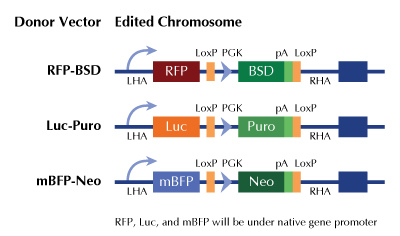IRF1 Human Gene Knockout Kit (CRISPR)
CAT#: KN203500LP
IRF1 - human gene knockout kit via CRISPR, HDR mediated
Functional Cassette: GFP-puro RFP-BSD mBFP-Neo
HDR-mediated knockout kit validation
USD 1,657.00
4 Weeks*
Specifications
| Product Data | |
| Format | 2 gRNA vectors, 1 Luciferase-Puro donor, 1 scramble control |
| Donor DNA | Luciferase-Puro |
| Symbol | IRF1 |
| Locus ID | 3659 |
| Components |
KN203500G1, IRF1 gRNA vector 1 in pCas-Guide CRISPR vector KN203500G2, IRF1 gRNA vector 2 in pCas-Guide CRISPR vector KN203500LPD, donor DNA containing left and right homologous arms and Luciferase-Puro functional cassette. GE100003, scramble sequence in pCas-Guide vector |
| Disclaimer | These products are manufactured and supplied by OriGene under license from ERS. The kit is designed based on the best knowledge of CRISPR technology. The system has been functionally validated for knocking-in the cassette downstream the native promoter. The efficiency of the knock-out varies due to the nature of the biology and the complexity of the experimental process. |
| Reference Data | |
| RefSeq | NM_002198, NM_001354924, NM_001354925, NR_149068, NR_149069 |
| UniProt ID | P10914 |
| Synonyms | IRF-1; MAR |
| Summary | The protein encoded by this gene is a transcriptional regulator and tumor suppressor, serving as an activator of genes involved in both innate and acquired immune responses. The encoded protein activates the transcription of genes involved in the body's response to viruses and bacteria, playing a role in cell proliferation, apoptosis, the immune response, and DNA damage response. This protein represses the transcription of several other genes. As a tumor suppressor, it both suppresses tumor cell growth and stimulates an immune response against tumor cells. Defects in this gene have been associated with gastric cancer, myelogenous leukemia, and lung cancer. [provided by RefSeq, Aug 2017] |
Documents
| Product Manuals |
| FAQs |
| SDS |
Resources
Other Versions
| SKU | Description | Size | Price |
|---|---|---|---|
| KN203500 | IRF1 - human gene knockout kit via CRISPR, HDR mediated |
USD 1,657.00 |
|
| KN203500BN | IRF1 - human gene knockout kit via CRISPR, HDR mediated |
USD 1,657.00 |
|
| KN203500RB | IRF1 - human gene knockout kit via CRISPR, HDR mediated |
USD 1,657.00 |
|
| KN403500 | IRF1 - KN2.0, Human gene knockout kit via CRISPR, non-homology mediated. |
USD 1,657.00 |
|
| GA102452 | IRF1 CRISPRa kit - CRISPR gene activation of human interferon regulatory factor 1 |
USD 1,657.00 |
{0} Product Review(s)
Be the first one to submit a review






























































































































































































































































 Germany
Germany
 Japan
Japan
 United Kingdom
United Kingdom
 China
China
